| Article ID | Journal | Published Year | Pages | File Type |
|---|---|---|---|---|
| 311624 | Advances in Life Course Research | 2012 | 14 Pages |
Using large-scale panel data, this paper examines how social contacts change across the life course. Fixed-effects regression models are used to ascertain within-person changes over a 12-year period. The models show that marriage does not affect weaker ties whereas it does change the nature of the stronger ties that people have: friendships become less important and more. Parenthood entails a shift toward more local ties: there are negative effects on friendships and acquaintances but these are compensated by positive effects on neighbors. Divorce and widowhood have positive effects on contact and support, but the effects are more pronounced for widowhood, especially for women. Age effects suggest a decline in the size of most subnetworks combined with increased support from relatives but not from friends, neighbors, and acquaintances. The findings are discussed in light of a theoretical framework which distinguishes the roles of needs, opportunities, and alternatives.
